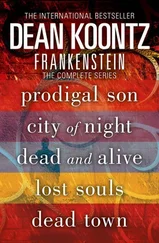After a while, the tranquilizer and the relaxation techniques taught by Caesar Zedd restored Junior's self-control.
The nurse stayed with him until his storm of tears had passed.
Clearly, he wasn't going to succumb to violent nervous emesis.
She promised to bring fresh apple juice after he complained that the serving before him had an odd taste.
Alone, calm again, Junior was able to apply what was arguably the central tenet of the philosophy of Zedd: Always look for the bright side.
Regardless — of the severity of a setback, no matter how dreadful a blow you sustained, you could always discover a bright side if you searched hard enough. The key to happiness, success, and mental health was utterly to ignore the negative, deny its power over you, and find reason to celebrate every development in life, including the cruelest catastrophe, by discovering the bright side to even the darkest hour.
In this case, the bright side was blindingly bright. Having lost both a singularly beautiful wife and an unborn child, Junior would earn the sympathy—the pity, the love—,of any jury in front of whom the state might hope to defend against a wrongful-death suit.
Earlier, he'd been surprised by the visit from Knacker, Hisscus, and Nork. He hadn't thought he'd see their kind for days; and then he would have expected no more than a single attorney taking a low-key approach and making a modest proposal.
Now he understood why they had descended in strength, eager to discuss redress, requital, restitutional apology. The coroner had in formed them, before the police, that Naomi had been pregnant, and they had recognized the state's extreme vulnerability.
The nurse returned with fresh apple juice, chilled and sweet.
Junior sipped the beverage slowly. By the time he reached the bottom of the glass, he had come to the inescapable conclusion that Naomi had been hiding her pregnancy from him.
In the six weeks since conception, she must have missed at least one menstrual period. She hadn't complained of morning sickness, but surely she'd experienced it. It was highly unlikely that she'd been unaware of her condition.
He had never expressed opposition to starting a family. She'd had no reason to fear telling him that she was carrying their child.
Regrettably, he had no choice but to conclude that she hadn't made up her mind whether to keep the baby or to seek out an illegal abortion without Junior's approval. She had been thinking about scraping his child out of her womb without even telling him.
This insult, this outrage, this treachery stunned Junior.
Inevitably, he had to wonder if Naomi had kept her pregnancy secret because, indeed, she suspected that the child wasn't her husband's.
If blood tests revealed that Junior wasn't the father, Vanadium would have a motive. It wouldn't be the right motive, because Junior truly hadn't known either that his wife was pregnant or that she was possibly screwing around with another man. But the detective would be able to sell it to a prosecutor, and the prosecutor would convince at least a few jurors.
Naomi, you dumb, unfaithful bitch.
He ardently wished that he hadn't killed her with such merciful swiftness. If he'd tortured her first, he would now have the memory of her suffering from which to take consolation.
For a while he looked for the bright side. It eluded him.
He ate the lime Jell-O. The soda crackers.
Eventually, Junior remembered the quarter. He reached into the right pocket of the thin cotton bathrobe, but the coin wasn't there, as it should have been. The left pocket also was empty.
WALTER PANGLO, the only mortician in Bright Beach, was a sweet tempered wisp of a man who enjoyed puttering in his garden when he wasn't planting dead people. He grew prize roses and gave them away in great bouquets to the sick, to young people in love, to the school librarian on her birthday, to clerks who had been polite to him.
His wife, Dorothea, adored him, not least of all because he had taken in her eighty-year-old mother and treated that elderly lady as though she were both a duchess and a saint. He was equally generous to the poor, burying their dead at cost but with utmost dignity.
Jacob Isaacson—twin brother of Edom-knew nothing negative about Panglo, but he didn't trust him. If the mortician had been caught prying gold teeth from the dead and carving satanic symbols in their buttocks, Jacob would have said, “It figures.” If Panglo had saved bottles of infected blood from diseased cadavers, and if one day he ran through town, splashing it in the faces of unsuspecting citizens, Jacob would not have raisers one eyebrow in surprise.
Jacob trusted no one but Agnes and Edom. He'd trusted Joey Lampion, too, after years of wary observance. Now Joey was dead, and his corpse was in the embalming chamber of the Panglo Funeral Home.
Currently, Jacob was far removed from the embalming chamber and intended never to set foot there, alive. With Walter Panglo as his guide, he toured the casket selection in the funeral-planning room.
He wanted the most expensive box for Joey; but Joey, a modest and prudent man, would have disapproved. Instead, he selected a handsome but not ornate casket just above the median price.
Deeply distressed that he was planning the funeral of a man as young as Joe Lampion, whom he had liked and admired, Panglo paused to express his disbelief and to murmur comforting words, more to himself than to Jacob, as each decision was made. With one hand on the chosen casket, he said, “Unbelievable, a traffic accident, and on the very day his son is born. So sad. So terribly sad."
“Not so unbelievable,” said Jacob. “Forty-five thousand people every year die in automobiles. Cars aren't transportation. They're death machines. Tens of thousands are disfigured, maimed for life."
Whereas Edom feared the wrath of nature, Jacob knew that the true hand of doom was the hand of humankind.
“Not that trains are any better. Look at the Bakersfield crash back in '60. Santa Fe Chief, out of San Francisco, smashed into an oil-tank truck. Seventeen people crushed, burned in a river of fire."
Jacob feared what men could do with clubs, knives, guns, bombs, with their bare hands, but he was most preoccupied by the unintended death that humanity brought upon itself with its devices, machines, and structures meant to improve the quality of life.
“Fifty died in London, in '57, when two trains crashed. And a hundred twelve were crushed, torn, mangled, in '52, also England."
Frowning, Panglo, said, “Terrible, you're right, so many terrible things happen, but I don't see why trains-"
“It's all the same. Cars, trains, ships, all the same,” Jacob insisted. “You remember the Toya Maru? Japanese ferry capsized back in September '54. Eleven hundred sixty-eight people dead. Or worse, in '48, off Manchuria, God almighty, the boiler exploded on a Chinese merchant ship, six thousand died. Six thousand on a single ship!"
Over the following hour, as Walter Panglo guided Jacob through the planning of the funeral, Jacob recounted the gruesome details of numerous airliner crashes, shipwrecks, train collisions, coal-mine disasters, darn collapses, hotel fires, nightclub fires, pipeline and oil-well explosions, munitions—plant explosions....
By the time all the details of mortuary and cemetery services were settled, Walter Panglo had a nervous tic in his left cheek. His eyes were open wide, as if he'd been so startled that his lids froze in a position of ascension, locked by a spasm of surprise. His hands must have grown clammy; he blotted them repeatedly on his suit.
Aware of the mortician's new edginess, Jacob was convinced that his initial distrust of Panglo was justified. This twitchy little guy seemed to have something to hide. Jacob didn't have to be a cop to recognize nervousness born of guilt.
Читать дальше











